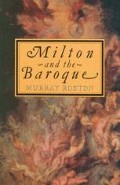Abstract
During the earlier part of this century, when Milton’s reputation was at a low ebb, the War in Heaven became, like the problem of the Satanic hero, a favoured target for censure, with comments ranging from mild admissions of embarrassment to outright condemnation, the latter being more frequent. No reader, it was argued, could be expected to take seriously the ludicrous picture of rarefied spirits buckling on swords and breastplates to engage in bodily warfare when the reader knew that none of the participants could be killed, or even more than momentarily injured. Although critics have more recently taken a very different view, that dismissal of the battle-scenes as a serious blemish on the work still has its adherents. J. B. Broadbent, for example, maintains that, since any attempt to depict the war seriously was hopeless from the start, Milton ought to have abandoned all effort to portray it in terrestrial terms and simply to have ‘… treated it all as science fiction’.1
Access this chapter
Tax calculation will be finalised at checkout
Purchases are for personal use only
Preview
Unable to display preview. Download preview PDF.
Notes to Chapter 4
J. B. Broadbent, Some Graver Subject: an essay on Paradise Lost (New York, 1960), p. 223.
Cf., Harold Fisch, ‘Hebraic Style and Motifs in Paradise Lost’, in Language and Style in Milton, ed. R. D. Emma and J. T. Shawcross (New York, 1967 ), p. 40.
J. M. Evans, ‘Paradise Lost’ and the Genesis Tradition (Oxford, 1968), pp. 34f. Grant McColley, ‘Paradise Lost’: an account of its growth and major origins (New York, 1963) provides a detailed survey of the development of this tradition.
Ludus Coventriae ed. K. S. Block, Early English Text Society (Oxford, 1960), p. 18.
Wayne Shumaker, Unpremeditated Muse: feeling and perception in Paradise Lost (Princeton, 1967), p. 22 makes the excellent point that in literature reason works best not, as is often thought, when it is divorced from aesthetic sensibility, but when both are engaged simultaneously.
B. Rajan, ‘Paradise Lost’ and the Seventeenth Century Reader (London, 1966), p. 96, writes interestingly of the ‘illusion of equality’ created at the opening of the poem. He suggests, however, that Satan is at once reduced in stature and never regains his splendour; and there we part ways. See also Geoffrey Hartman, Beyond Formalism (New Haven, 1970), pp. 115f., for a contrast between God’s divine imperturbability and the vigour of Satan’s rebellion.
J. H. Hanford, ‘Milton and the Art of War’, Modern Philology, 18 (1921), p. 232. The idea is echoed by Joseph Summers, ‘The Embarrassments of Paradise Lost’, in Approaches to Paradise Lost, ed. C. A. Patrides (London, 1965 ), p. 69.
John S. Diekhoff, Milton’s ‘Paradise Lost’: a commentary on the argument (New York, 1963). On the prologues and invocations, see also E. M. W. Tillyard, Milton, pp. 207f., and, on the problem of Milton as narrator, Arnold Stein, The Art of Presence (Berkeley, 1977 ).
Copyright information
© 1980 Murray Roston
About this chapter
Cite this chapter
Roston, M. (1980). The War in Heaven. In: Milton and the Baroque. Palgrave Macmillan, London. https://doi.org/10.1007/978-1-349-04982-0_4
Download citation
DOI: https://doi.org/10.1007/978-1-349-04982-0_4
Publisher Name: Palgrave Macmillan, London
Print ISBN: 978-1-349-04984-4
Online ISBN: 978-1-349-04982-0
eBook Packages: Palgrave Literature & Performing Arts CollectionLiterature, Cultural and Media Studies (R0)

